Ian Gordon
Partner
Head of Pensions Disputes (UK)
Article
The law of privilege gives someone the comfort of knowing they can keep certain documents confidential and not have to provide them to third parties. However, working out whether a document is privileged can be tricky. In this Insight we set out some general principles and some basic tips to help ensure that, once a document is privileged, that privilege is not later inadvertently lost.
Whether a document is privileged can be fact-specific, if in doubt please contact a member of our Pensions Disputes Team.
Privilege entitles a person to withhold a document from a third party, whether that be a trustee, an employer, a court, the Pensions Regulator (tPR) or HMRC. It is an absolute right, exercisable in and outside court proceedings.
A document cannot be privileged unless it is confidential so, if a privileged document ceases to be confidential, it will lose its privileged status.
The three core categories of privilege are:
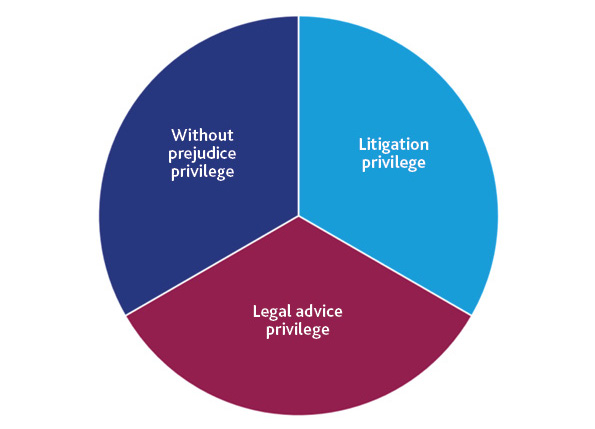
Other categories of privilege, namely, joint or common interest privilege, also exist but they are not free-standing categories of privilege but depend on a document having already attracted legal advice or litigation privilege.
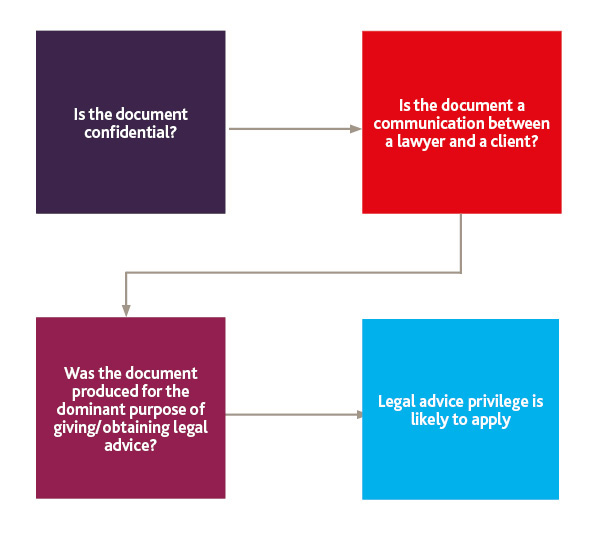
If you cannot answer "Yes" to any of these questions, the document was either never covered by legal advice privilege or, having once been privileged, privilege was later lost, for example, because the document ceased to be confidential.
To be covered by legal advice privilege, the document needs to have been a communication between a client and their lawyer.
The term 'lawyer' covers solicitors, barristers or qualified foreign lawyers, as well as in-house lawyers so long as they are acting in a legal rather than commercial capacity. Privilege also extends to trainees and paralegals acting under the supervision of a lawyer.
The definition of 'the client' is likely to be interpreted restrictively by the courts to refer to those members of the organisation with authority to give instructions to lawyers and receive their advice. Therefore, care needs to be taken when disseminating advice received within an organisation in case it is later suggested that confidentiality in that advice was lost by being shown to 'non-clients'.
The court decided in The Civil Aviation Authority v Jet2.com Limited, R. (on the application of) that to be covered by legal advice privilege the document must have been created for the dominant purpose of seeking and giving such advice. If that can be established, the document should be privileged even if it fulfilled another purpose, for example, seeking the commercial views of others. However, if the dominant purpose of the document was not to seek and provide legal advice, the document will not be covered by legal advice privilege even if one purpose of the document was to seek and obtain such advice.
This covers confidential communications (not necessarily between a client and its lawyers) or other documents produced for the dominant purpose of existing, pending or reasonably contemplated litigation. 'Litigation' can extend beyond court proceedings and include adversarial proceedings brought by public bodies such as tPR.
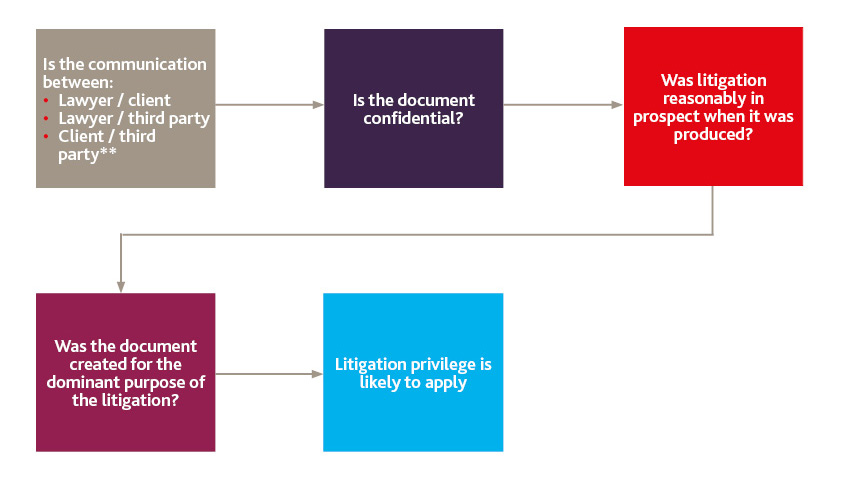
**Note that litigation privilege is broader than legal advice privilege in that it can cover communications between a client's lawyer and a third party, as well as the client and a third party, if such communications were for the dominant purpose of litigation.
Points to be aware of:
This prevents statements made in an attempt to settle a dispute from being put before the court. Labelling a document 'without prejudice' will not make it privileged if it was not a communication made in an attempt to settle. Conversely, not labelling a document 'without prejudice' will not preclude it from being privileged if it was a communication made to try to settle.
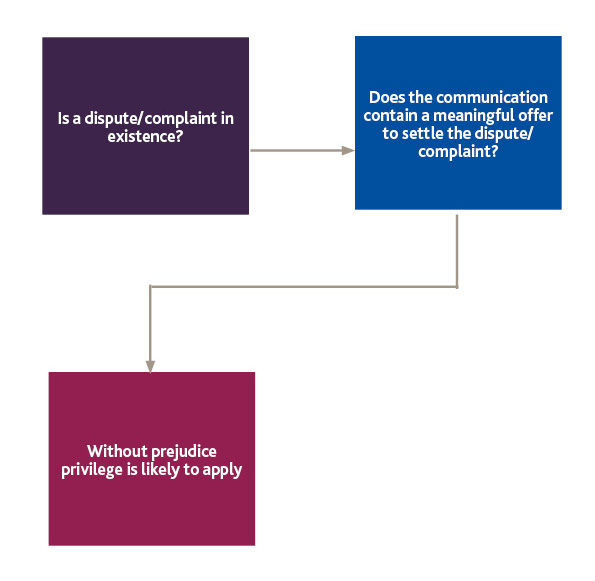
Where two or more parties retain the same legal adviser, each will be entitled to see privileged communications created after the retainer was concluded to which they were not originally a party if it has a joint interest in the subject matter of a privileged communication. Relationships where a joint interest can arise include beneficiaries and trustees, a company and its shareholders, partners in a partnership, and a parent company and its subsidiaries.

Common interest privilege enables the sharing of privileged documents with other parties who have the same interest. That interest needs to exist at the time of the disclosure of the communication. Examples of persons who may have a common interest may include employers and trustees, and companies in the same group. In practice it is prudent for parties to document the extent of the common interest before sharing privileged material.
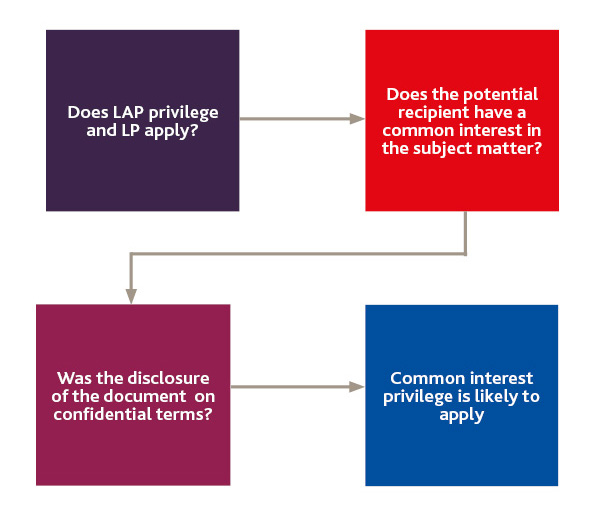
A privileged document may cease to be privileged in a number of ways. First, the document may cease to be confidential because it was provided to a third party.
For example, a pension scheme trustee might have provided a copy of privileged legal advice it received to the scheme's employer or to tPR. The advice will no longer be confidential vis-à-vis that third party, although it might still be confidential (and therefore privileged preserved) vis-à-vis other parties.
It will be important for the party sharing the advice it has received with another to make it clear to (or better agreed with) the intended recipient that it (i.e. the recipient) will only receive the advice for a specific and limited purpose, and that the recipient needs to keep the advice confidential.
Issues can arise when privileged legal advice is provided to corporate entities and that advice is disseminated within the organisation beyond individuals who have authority to instruct and receive from legal advisers. There is a risk that such dissemination will result in the advice ceasing to be confidential and, therefore, privileged.
It will be important to make clear the basis on which the advice is being disseminated within the organisation, to stress that it must be kept confidential and to limit the number of people with whom the advice is shared.
Privilege in a document might also be waived, for example, when a party seeks to deploy a privileged document in Court proceedings by relying on it in a statement of case or a witness statement. This area of law is not straight-forward and a party might be found to have waived privilege in a document even when they did not intend to do so.
NOT LEGAL ADVICE. Information made available on this website in any form is for information purposes only. It is not, and should not be taken as, legal advice. You should not rely on, or take or fail to take any action based upon this information. Never disregard professional legal advice or delay in seeking legal advice because of something you have read on this website. Gowling WLG professionals will be pleased to discuss resolutions to specific legal concerns you may have.